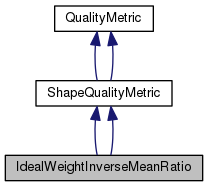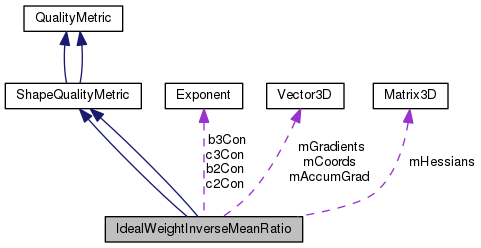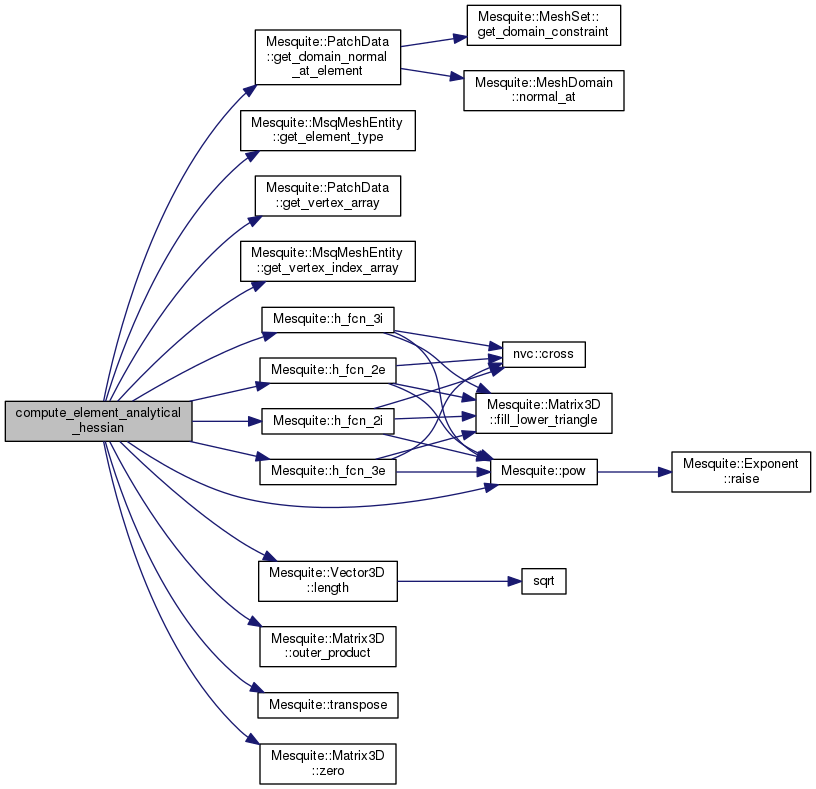Computes the inverse mean ratio of given element. More...
#include <IdealWeightInverseMeanRatio.hpp>


Public Member Functions | |
| IdealWeightInverseMeanRatio (MsqError &err, double pow_dbl=1.0) | |
| virtual | ~IdealWeightInverseMeanRatio () |
| virtual destructor ensures use of polymorphism during destruction More... | |
| bool | evaluate_element (PatchData &pd, MsqMeshEntity *element, double &fval, MsqError &err) |
| evaluate using mesquite objects More... | |
| bool | compute_element_analytical_gradient (PatchData &pd, MsqMeshEntity *element, MsqVertex *free_vtces[], Vector3D grad_vec[], int num_vtx, double &metric_value, MsqError &err) |
| Virtual function that computes the gradient of the QualityMetric analytically. The base class implementation of this function simply prints a warning and calls compute_numerical_gradient to calculate the gradient. This is used by metric which mType is ELEMENT_BASED. For parameters, see compute_element_gradient() . More... | |
| bool | compute_element_analytical_hessian (PatchData &pd, MsqMeshEntity *e, MsqVertex *v[], Vector3D g[], Matrix3D h[], int nv, double &m, MsqError &err) |
| IdealWeightInverseMeanRatio (MsqError &err, double pow_dbl=1.0) | |
| virtual | ~IdealWeightInverseMeanRatio () |
| virtual destructor ensures use of polymorphism during destruction More... | |
| bool | evaluate_element (PatchData &pd, MsqMeshEntity *element, double &fval, MsqError &err) |
| evaluate using mesquite objects More... | |
| bool | compute_element_analytical_gradient (PatchData &pd, MsqMeshEntity *element, MsqVertex *free_vtces[], Vector3D grad_vec[], int num_vtx, double &metric_value, MsqError &err) |
| Virtual function that computes the gradient of the QualityMetric analytically. The base class implementation of this function simply prints a warning and calls compute_numerical_gradient to calculate the gradient. This is used by metric which mType is ELEMENT_BASED. For parameters, see compute_element_gradient() . More... | |
| bool | compute_element_analytical_hessian (PatchData &pd, MsqMeshEntity *e, MsqVertex *v[], Vector3D g[], Matrix3D h[], int nv, double &m, MsqError &err) |
 Public Member Functions inherited from ShapeQualityMetric Public Member Functions inherited from ShapeQualityMetric | |
| virtual | ~ShapeQualityMetric () |
| virtual destructor ensures use of polymorphism during destruction More... | |
| virtual | ~ShapeQualityMetric () |
| virtual destructor ensures use of polymorphism during destruction More... | |
 Public Member Functions inherited from QualityMetric Public Member Functions inherited from QualityMetric | |
| virtual | ~QualityMetric () |
| MetricType | get_metric_type () |
| void | set_element_evaluation_mode (ElementEvaluationMode mode, MsqError &err) |
| Sets the evaluation mode for the ELEMENT_BASED metrics. More... | |
| ElementEvaluationMode | get_element_evaluation_mode () |
| Returns the evaluation mode for the metric. More... | |
| void | set_averaging_method (AveragingMethod method, MsqError &err) |
| void | set_feasible_constraint (int alpha) |
| int | get_feasible_constraint () |
| Returns the feasible flag for this metric. More... | |
| void | set_name (msq_std::string st) |
| Sets the name of this metric. More... | |
| msq_std::string | get_name () |
| Returns the name of this metric (as a string). More... | |
| double | vertex_barrier_function (double det, double delta) |
| Escobar Barrier Function for Shape and Other Metrics. More... | |
| virtual bool | evaluate_vertex (PatchData &, MsqVertex *, double &, MsqError &err) |
| Evaluate the metric for a vertex. More... | |
| void | set_gradient_type (GRADIENT_TYPE grad) |
| Sets gradType for this metric. More... | |
| void | set_hessian_type (HESSIAN_TYPE ht) |
| Sets hessianType for this metric. More... | |
| bool | compute_vertex_gradient (PatchData &pd, MsqVertex &vertex, MsqVertex *vertices[], Vector3D grad_vec[], int num_vtx, double &metric_value, MsqError &err) |
| Calls compute_vertex_numerical_gradient if gradType equals NUMERCIAL_GRADIENT. Calls compute_vertex_analytical_gradient if gradType equals ANALYTICAL_GRADIENT;. More... | |
| bool | compute_element_gradient (PatchData &pd, MsqMeshEntity *element, MsqVertex *free_vtces[], Vector3D grad_vec[], int num_free_vtx, double &metric_value, MsqError &err) |
| For MetricType == ELEMENT_BASED. Calls either compute_element_numerical_gradient() or compute_element_analytical_gradient() for gradType equal NUMERICAL_GRADIENT or ANALYTICAL_GRADIENT, respectively. More... | |
| bool | compute_element_gradient_expanded (PatchData &pd, MsqMeshEntity *element, MsqVertex *free_vtces[], Vector3D grad_vec[], int num_free_vtx, double &metric_value, MsqError &err) |
| bool | compute_element_hessian (PatchData &pd, MsqMeshEntity *element, MsqVertex *free_vtces[], Vector3D grad_vec[], Matrix3D hessian[], int num_free_vtx, double &metric_value, MsqError &err) |
| For MetricType == ELEMENT_BASED. Calls either compute_element_numerical_hessian() or compute_element_analytical_hessian() for hessianType equal NUMERICAL_HESSIAN or ANALYTICAL_HESSIAN, respectively. More... | |
| void | set_negate_flag (int neg) |
| int | get_negate_flag () |
| Returns negateFlag. More... | |
| virtual void | change_metric_type (MetricType t, MsqError &err) |
| virtual | ~QualityMetric () |
| MetricType | get_metric_type () |
| void | set_element_evaluation_mode (ElementEvaluationMode mode, MsqError &err) |
| Sets the evaluation mode for the ELEMENT_BASED metrics. More... | |
| ElementEvaluationMode | get_element_evaluation_mode () |
| Returns the evaluation mode for the metric. More... | |
| void | set_averaging_method (AveragingMethod method, MsqError &err) |
| void | set_feasible_constraint (int alpha) |
| int | get_feasible_constraint () |
| Returns the feasible flag for this metric. More... | |
| void | set_name (msq_std::string st) |
| Sets the name of this metric. More... | |
| msq_std::string | get_name () |
| Returns the name of this metric (as a string). More... | |
| double | vertex_barrier_function (double det, double delta) |
| Escobar Barrier Function for Shape and Other Metrics. More... | |
| virtual bool | evaluate_vertex (PatchData &, MsqVertex *, double &, MsqError &err) |
| Evaluate the metric for a vertex. More... | |
| void | set_gradient_type (GRADIENT_TYPE grad) |
| Sets gradType for this metric. More... | |
| void | set_hessian_type (HESSIAN_TYPE ht) |
| Sets hessianType for this metric. More... | |
| bool | compute_vertex_gradient (PatchData &pd, MsqVertex &vertex, MsqVertex *vertices[], Vector3D grad_vec[], int num_vtx, double &metric_value, MsqError &err) |
| bool | compute_element_gradient (PatchData &pd, MsqMeshEntity *element, MsqVertex *free_vtces[], Vector3D grad_vec[], int num_free_vtx, double &metric_value, MsqError &err) |
| For MetricType == ELEMENT_BASED. Calls either compute_element_numerical_gradient() or compute_element_analytical_gradient() for gradType equal NUMERICAL_GRADIENT or ANALYTICAL_GRADIENT, respectively. More... | |
| bool | compute_element_gradient_expanded (PatchData &pd, MsqMeshEntity *element, MsqVertex *free_vtces[], Vector3D grad_vec[], int num_free_vtx, double &metric_value, MsqError &err) |
| bool | compute_element_hessian (PatchData &pd, MsqMeshEntity *element, MsqVertex *free_vtces[], Vector3D grad_vec[], Matrix3D hessian[], int num_free_vtx, double &metric_value, MsqError &err) |
| For MetricType == ELEMENT_BASED. Calls either compute_element_numerical_hessian() or compute_element_analytical_hessian() for hessianType equal NUMERICAL_HESSIAN or ANALYTICAL_HESSIAN, respectively. More... | |
| void | set_negate_flag (int neg) |
| int | get_negate_flag () |
| Returns negateFlag. More... | |
| virtual void | change_metric_type (MetricType t, MsqError &err) |
Private Member Functions | |
| void | set_metric_power (double pow_dbl, MsqError &err) |
| Sets the power value in the metric computation. More... | |
| void | set_metric_power (double pow_dbl, MsqError &err) |
| Sets the power value in the metric computation. More... | |
Private Attributes | |
| Vector3D | mCoords [4] |
| Vector3D | mGradients [32] |
| Vector3D | mAccumGrad [8] |
| Matrix3D | mHessians [80] |
| double | mMetrics [8] |
| double | g_factor [8] |
| double | h_factor [8] |
| double | a2Con |
| Exponent | b2Con |
| Exponent | c2Con |
| double | a3Con |
| Exponent | b3Con |
| Exponent | c3Con |
Additional Inherited Members | |
 Public Types inherited from QualityMetric Public Types inherited from QualityMetric | |
| enum | MetricType { MT_UNDEFINED, VERTEX_BASED, ELEMENT_BASED, VERTEX_BASED_FREE_ONLY, MT_UNDEFINED, VERTEX_BASED, ELEMENT_BASED, VERTEX_BASED_FREE_ONLY } |
| enum | ElementEvaluationMode { EEM_UNDEFINED, ELEMENT_VERTICES, LINEAR_GAUSS_POINTS, QUADRATIC_GAUSS_POINTS, CUBIC_GAUSS_POINTS, EEM_UNDEFINED, ELEMENT_VERTICES, LINEAR_GAUSS_POINTS, QUADRATIC_GAUSS_POINTS, CUBIC_GAUSS_POINTS } |
| enum | AveragingMethod { NONE, LINEAR, RMS, HMS, MINIMUM, MAXIMUM, HARMONIC, GEOMETRIC, SUM, SUM_SQUARED, GENERALIZED_MEAN, STANDARD_DEVIATION, MAX_OVER_MIN, MAX_MINUS_MIN, SUM_OF_RATIOS_SQUARED, NONE, LINEAR, RMS, HMS, MINIMUM, MAXIMUM, HARMONIC, GEOMETRIC, SUM, SUM_SQUARED, GENERALIZED_MEAN, STANDARD_DEVIATION, MAX_OVER_MIN, MAX_MINUS_MIN, SUM_OF_RATIOS_SQUARED } |
| enum | GRADIENT_TYPE { NUMERICAL_GRADIENT, ANALYTICAL_GRADIENT, NUMERICAL_GRADIENT, ANALYTICAL_GRADIENT } |
| enum | HESSIAN_TYPE { NUMERICAL_HESSIAN, ANALYTICAL_HESSIAN, NUMERICAL_HESSIAN, ANALYTICAL_HESSIAN } |
| enum | MetricType { MT_UNDEFINED, VERTEX_BASED, ELEMENT_BASED, VERTEX_BASED_FREE_ONLY, MT_UNDEFINED, VERTEX_BASED, ELEMENT_BASED, VERTEX_BASED_FREE_ONLY } |
| enum | ElementEvaluationMode { EEM_UNDEFINED, ELEMENT_VERTICES, LINEAR_GAUSS_POINTS, QUADRATIC_GAUSS_POINTS, CUBIC_GAUSS_POINTS, EEM_UNDEFINED, ELEMENT_VERTICES, LINEAR_GAUSS_POINTS, QUADRATIC_GAUSS_POINTS, CUBIC_GAUSS_POINTS } |
| enum | AveragingMethod { NONE, LINEAR, RMS, HMS, MINIMUM, MAXIMUM, HARMONIC, GEOMETRIC, SUM, SUM_SQUARED, GENERALIZED_MEAN, STANDARD_DEVIATION, MAX_OVER_MIN, MAX_MINUS_MIN, SUM_OF_RATIOS_SQUARED, NONE, LINEAR, RMS, HMS, MINIMUM, MAXIMUM, HARMONIC, GEOMETRIC, SUM, SUM_SQUARED, GENERALIZED_MEAN, STANDARD_DEVIATION, MAX_OVER_MIN, MAX_MINUS_MIN, SUM_OF_RATIOS_SQUARED } |
| enum | GRADIENT_TYPE { NUMERICAL_GRADIENT, ANALYTICAL_GRADIENT, NUMERICAL_GRADIENT, ANALYTICAL_GRADIENT } |
| enum | HESSIAN_TYPE { NUMERICAL_HESSIAN, ANALYTICAL_HESSIAN, NUMERICAL_HESSIAN, ANALYTICAL_HESSIAN } |
 Protected Member Functions inherited from ShapeQualityMetric Protected Member Functions inherited from ShapeQualityMetric | |
| bool | condition_number_2d (Vector3D temp_vec[], size_t v_ind, PatchData &pd, double &fval, MsqError &err) |
| Given the 2-d jacobian matrix, compute the condition number, fval. More... | |
| bool | condition_number_3d (Vector3D temp_vec[], PatchData &pd, double &fval, MsqError &err) |
| Given the 3-d jacobian matrix, compute the condition number, fval. More... | |
| bool | condition_number_2d (Vector3D temp_vec[], size_t v_ind, PatchData &pd, double &fval, MsqError &err) |
| Given the 2-d jacobian matrix, compute the condition number, fval. More... | |
| bool | condition_number_3d (Vector3D temp_vec[], PatchData &pd, double &fval, MsqError &err) |
| Given the 3-d jacobian matrix, compute the condition number, fval. More... | |
 Protected Member Functions inherited from QualityMetric Protected Member Functions inherited from QualityMetric | |
| QualityMetric () | |
| void | set_metric_type (MetricType t) |
| This function should be used in the constructor of every concrete quality metric. More... | |
| double | average_metrics (const double metric_values[], const int &num_values, MsqError &err) |
| average_metrics takes an array of length num_values and averages the contents using averaging method data member avgMethod . More... | |
| double | average_metric_and_weights (double metric_values[], int num_metric_values, MsqError &err) |
| Given a list of metric values, calculate the average metric valude according to the current avgMethod and write into the passed metric_values array the the value weight/count to use when averaging gradient vectors for the metric. More... | |
| double | weighted_average_metrics (const double coef[], const double metric_values[], const int &num_values, MsqError &err) |
| takes an array of coefficients and an array of metrics (both of length num_value) and averages the contents using averaging method 'method'. More... | |
| bool | compute_vertex_numerical_gradient (PatchData &pd, MsqVertex &vertex, MsqVertex *vertices[], Vector3D grad_vec[], int num_vtx, double &metric_value, MsqError &err) |
| bool | compute_element_numerical_gradient (PatchData &pd, MsqMeshEntity *element, MsqVertex *free_vtces[], Vector3D grad_vec[], int num_free_vtx, double &metric_value, MsqError &err) |
| Non-virtual function which numerically computes the gradient of a QualityMetric of a given element for a given set of free vertices on that element. This is used by metric which mType is ELEMENT_BASED. For parameters, see compute_element_gradient() . More... | |
| virtual bool | compute_vertex_analytical_gradient (PatchData &pd, MsqVertex &vertex, MsqVertex *vertices[], Vector3D grad_vec[], int num_vtx, double &metric_value, MsqError &err) |
| Virtual function that computes the gradient of the QualityMetric analytically. The base class implementation of this function simply prints a warning and calls compute_numerical_gradient to calculate the gradient. This is used by metric which mType is VERTEX_BASED. More... | |
| bool | compute_element_numerical_hessian (PatchData &pd, MsqMeshEntity *element, MsqVertex *free_vtces[], Vector3D grad_vec[], Matrix3D hessian[], int num_free_vtx, double &metric_value, MsqError &err) |
| QualityMetric () | |
| void | set_metric_type (MetricType t) |
| This function should be used in the constructor of every concrete quality metric. More... | |
| double | average_metrics (const double metric_values[], const int &num_values, MsqError &err) |
| average_metrics takes an array of length num_values and averages the contents using averaging method data member avgMethod . More... | |
| double | average_metric_and_weights (double metric_values[], int num_metric_values, MsqError &err) |
| Given a list of metric values, calculate the average metric valude according to the current avgMethod and write into the passed metric_values array the the value weight/count to use when averaging gradient vectors for the metric. More... | |
| double | weighted_average_metrics (const double coef[], const double metric_values[], const int &num_values, MsqError &err) |
| takes an array of coefficients and an array of metrics (both of length num_value) and averages the contents using averaging method 'method'. More... | |
| bool | compute_vertex_numerical_gradient (PatchData &pd, MsqVertex &vertex, MsqVertex *vertices[], Vector3D grad_vec[], int num_vtx, double &metric_value, MsqError &err) |
| bool | compute_element_numerical_gradient (PatchData &pd, MsqMeshEntity *element, MsqVertex *free_vtces[], Vector3D grad_vec[], int num_free_vtx, double &metric_value, MsqError &err) |
| Non-virtual function which numerically computes the gradient of a QualityMetric of a given element for a given set of free vertices on that element. This is used by metric which mType is ELEMENT_BASED. For parameters, see compute_element_gradient() . More... | |
| virtual bool | compute_vertex_analytical_gradient (PatchData &pd, MsqVertex &vertex, MsqVertex *vertices[], Vector3D grad_vec[], int num_vtx, double &metric_value, MsqError &err) |
| Virtual function that computes the gradient of the QualityMetric analytically. The base class implementation of this function simply prints a warning and calls compute_numerical_gradient to calculate the gradient. This is used by metric which mType is VERTEX_BASED. More... | |
| bool | compute_element_numerical_hessian (PatchData &pd, MsqMeshEntity *element, MsqVertex *free_vtces[], Vector3D grad_vec[], Matrix3D hessian[], int num_free_vtx, double &metric_value, MsqError &err) |
 Protected Attributes inherited from QualityMetric Protected Attributes inherited from QualityMetric | |
| AveragingMethod | avgMethod |
| int | feasible |
| msq_std::string | metricName |
Computes the inverse mean ratio of given element.
The metric does not use the sample point functionality or the compute_weighted_jacobian. It evaluates the metric at the element vertices, and uses the isotropic ideal element. Optionally, the metric computation can be raised to the 'pow_dbl' power. This does not necessarily raise the metric value to the 'pow_dbl' power but instead raises each local metric. For example, if the corner inverse mean ratios of a quadraliteral element were m1,m2,m3, and m4 and we set pow_dbl=2 and used linear averaging, the metric value would then be m = .25(m1*m1 + m2*m2 + m3*m3 + m4*m4). The metric does require a feasible region, and the metric needs to be minimized if pow_dbl is greater than zero and maximized if pow_dbl is less than zero. pow_dbl being equal to zero is invalid.
Definition at line 71 of file includeLinks/IdealWeightInverseMeanRatio.hpp.
| IdealWeightInverseMeanRatio | ( | MsqError & | err, |
| double | pow_dbl = 1.0 |
||
| ) |
Definition at line 53 of file QualityMetric/Shape/IdealWeightInverseMeanRatio.cpp.
References QualityMetric::ANALYTICAL_GRADIENT, QualityMetric::ANALYTICAL_HESSIAN, QualityMetric::avgMethod, QualityMetric::ELEMENT_BASED, QualityMetric::ELEMENT_VERTICES, QualityMetric::feasible, QualityMetric::LINEAR, MSQ_ERRRTN, QualityMetric::set_element_evaluation_mode(), QualityMetric::set_gradient_type(), QualityMetric::set_hessian_type(), IdealWeightInverseMeanRatio::set_metric_power(), QualityMetric::set_metric_type(), and QualityMetric::set_name().

|
inlinevirtual |
virtual destructor ensures use of polymorphism during destruction
Definition at line 77 of file includeLinks/IdealWeightInverseMeanRatio.hpp.
| IdealWeightInverseMeanRatio | ( | MsqError & | err, |
| double | pow_dbl = 1.0 |
||
| ) |
|
inlinevirtual |
virtual destructor ensures use of polymorphism during destruction
Definition at line 77 of file src/QualityMetric/Shape/IdealWeightInverseMeanRatio.hpp.
|
virtual |
Virtual function that computes the gradient of the QualityMetric analytically. The base class implementation of this function simply prints a warning and calls compute_numerical_gradient to calculate the gradient. This is used by metric which mType is ELEMENT_BASED. For parameters, see compute_element_gradient() .
If that function is not over-riden in the concrete class, the base
Parameters description, see QualityMetric::compute_element_gradient() .
Reimplemented from QualityMetric.
Definition at line 168 of file QualityMetric/Shape/IdealWeightInverseMeanRatio.cpp.
References IdealWeightInverseMeanRatio::a2Con, IdealWeightInverseMeanRatio::a3Con, QualityMetric::average_metric_and_weights(), QualityMetric::avgMethod, IdealWeightInverseMeanRatio::b2Con, IdealWeightInverseMeanRatio::b3Con, IdealWeightInverseMeanRatio::c2Con, IdealWeightInverseMeanRatio::c3Con, Mesquite::g_fcn_2e(), Mesquite::g_fcn_2i(), Mesquite::g_fcn_3e(), Mesquite::g_fcn_3i(), PatchData::get_domain_normal_at_element(), MsqMeshEntity::get_element_type(), PatchData::get_vertex_array(), MsqMeshEntity::get_vertex_index_array(), Mesquite::HEXAHEDRON, i, j, Vector3D::length(), IdealWeightInverseMeanRatio::mAccumGrad, QualityMetric::MAXIMUM, IdealWeightInverseMeanRatio::mCoords, IdealWeightInverseMeanRatio::mGradients, QualityMetric::MINIMUM, IdealWeightInverseMeanRatio::mMetrics, MSQ_DBGOUT, MSQ_ERRZERO, n, Mesquite::QUADRILATERAL, Mesquite::TETRAHEDRON, and Mesquite::TRIANGLE.

|
virtual |
Virtual function that computes the gradient of the QualityMetric analytically. The base class implementation of this function simply prints a warning and calls compute_numerical_gradient to calculate the gradient. This is used by metric which mType is ELEMENT_BASED. For parameters, see compute_element_gradient() .
If that function is not over-riden in the concrete class, the base
Parameters description, see QualityMetric::compute_element_gradient() .
Reimplemented from QualityMetric.
|
virtual |
If that function is not over-riden in the concrete class, the base class function makes it default to a numerical hessian.
For parameters description, see QualityMetric::compute_element_hessian() .
Reimplemented from QualityMetric.
|
virtual |
If that function is not over-riden in the concrete class, the base class function makes it default to a numerical hessian.
For parameters description, see QualityMetric::compute_element_hessian() .
Reimplemented from QualityMetric.
Definition at line 298 of file QualityMetric/Shape/IdealWeightInverseMeanRatio.cpp.
References IdealWeightInverseMeanRatio::a2Con, IdealWeightInverseMeanRatio::a3Con, QualityMetric::avgMethod, IdealWeightInverseMeanRatio::b2Con, IdealWeightInverseMeanRatio::b3Con, IdealWeightInverseMeanRatio::c2Con, IdealWeightInverseMeanRatio::c3Con, IdealWeightInverseMeanRatio::g_factor, QualityMetric::GEOMETRIC, PatchData::get_domain_normal_at_element(), MsqMeshEntity::get_element_type(), PatchData::get_vertex_array(), MsqMeshEntity::get_vertex_index_array(), IdealWeightInverseMeanRatio::h_factor, Mesquite::h_fcn_2e(), Mesquite::h_fcn_2i(), Mesquite::h_fcn_3e(), Mesquite::h_fcn_3i(), QualityMetric::HARMONIC, Mesquite::HEXAHEDRON, QualityMetric::HMS, i, MsqError::INVALID_STATE, j, k, Vector3D::length(), QualityMetric::LINEAR, QualityMetric::MAXIMUM, IdealWeightInverseMeanRatio::mCoords, IdealWeightInverseMeanRatio::mGradients, IdealWeightInverseMeanRatio::mHessians, QualityMetric::MINIMUM, IdealWeightInverseMeanRatio::mMetrics, MSQ_DBGOUT, MSQ_ERRZERO, MSQ_SETERR, n, MsqError::NOT_IMPLEMENTED, Matrix3D::outer_product(), Mesquite::pow(), Mesquite::QUADRILATERAL, QualityMetric::RMS, QualityMetric::SUM, QualityMetric::SUM_SQUARED, Mesquite::TETRAHEDRON, Mesquite::transpose(), Mesquite::TRIANGLE, and Matrix3D::zero().

|
virtual |
evaluate using mesquite objects
Reimplemented from QualityMetric.
|
virtual |
evaluate using mesquite objects
Reimplemented from QualityMetric.
Definition at line 87 of file QualityMetric/Shape/IdealWeightInverseMeanRatio.cpp.
References IdealWeightInverseMeanRatio::a2Con, IdealWeightInverseMeanRatio::a3Con, QualityMetric::average_metrics(), IdealWeightInverseMeanRatio::b2Con, IdealWeightInverseMeanRatio::b3Con, IdealWeightInverseMeanRatio::c2Con, IdealWeightInverseMeanRatio::c3Con, PatchData::get_domain_normal_at_element(), MsqMeshEntity::get_element_type(), PatchData::get_vertex_array(), MsqMeshEntity::get_vertex_index_array(), Mesquite::HEXAHEDRON, i, Vector3D::length(), Mesquite::m_fcn_2e(), Mesquite::m_fcn_2i(), Mesquite::m_fcn_3e(), Mesquite::m_fcn_3i(), IdealWeightInverseMeanRatio::mCoords, IdealWeightInverseMeanRatio::mMetrics, MSQ_ERRZERO, n, Mesquite::QUADRILATERAL, Mesquite::TETRAHEDRON, and Mesquite::TRIANGLE.

|
private |
Sets the power value in the metric computation.
|
private |
Sets the power value in the metric computation.
Definition at line 68 of file QualityMetric/Shape/IdealWeightInverseMeanRatio.cpp.
References IdealWeightInverseMeanRatio::a2Con, IdealWeightInverseMeanRatio::a3Con, IdealWeightInverseMeanRatio::b2Con, IdealWeightInverseMeanRatio::b3Con, IdealWeightInverseMeanRatio::c2Con, IdealWeightInverseMeanRatio::c3Con, MsqError::INVALID_ARG, Mesquite::MSQ_MIN, MSQ_SETERR, Mesquite::pow(), and QualityMetric::set_negate_flag().
Referenced by IdealWeightInverseMeanRatio::IdealWeightInverseMeanRatio().


|
private |
Definition at line 116 of file includeLinks/IdealWeightInverseMeanRatio.hpp.
Referenced by IdealWeightInverseMeanRatio::compute_element_analytical_gradient(), IdealWeightInverseMeanRatio::compute_element_analytical_hessian(), IdealWeightInverseMeanRatio::evaluate_element(), and IdealWeightInverseMeanRatio::set_metric_power().
|
private |
Definition at line 120 of file includeLinks/IdealWeightInverseMeanRatio.hpp.
Referenced by IdealWeightInverseMeanRatio::compute_element_analytical_gradient(), IdealWeightInverseMeanRatio::compute_element_analytical_hessian(), IdealWeightInverseMeanRatio::evaluate_element(), and IdealWeightInverseMeanRatio::set_metric_power().
|
private |
Definition at line 117 of file includeLinks/IdealWeightInverseMeanRatio.hpp.
Referenced by IdealWeightInverseMeanRatio::compute_element_analytical_gradient(), IdealWeightInverseMeanRatio::compute_element_analytical_hessian(), IdealWeightInverseMeanRatio::evaluate_element(), and IdealWeightInverseMeanRatio::set_metric_power().
|
private |
Definition at line 121 of file includeLinks/IdealWeightInverseMeanRatio.hpp.
Referenced by IdealWeightInverseMeanRatio::compute_element_analytical_gradient(), IdealWeightInverseMeanRatio::compute_element_analytical_hessian(), IdealWeightInverseMeanRatio::evaluate_element(), and IdealWeightInverseMeanRatio::set_metric_power().
|
private |
Definition at line 118 of file includeLinks/IdealWeightInverseMeanRatio.hpp.
Referenced by IdealWeightInverseMeanRatio::compute_element_analytical_gradient(), IdealWeightInverseMeanRatio::compute_element_analytical_hessian(), IdealWeightInverseMeanRatio::evaluate_element(), and IdealWeightInverseMeanRatio::set_metric_power().
|
private |
Definition at line 122 of file includeLinks/IdealWeightInverseMeanRatio.hpp.
Referenced by IdealWeightInverseMeanRatio::compute_element_analytical_gradient(), IdealWeightInverseMeanRatio::compute_element_analytical_hessian(), IdealWeightInverseMeanRatio::evaluate_element(), and IdealWeightInverseMeanRatio::set_metric_power().
|
private |
Definition at line 113 of file includeLinks/IdealWeightInverseMeanRatio.hpp.
Referenced by IdealWeightInverseMeanRatio::compute_element_analytical_hessian().
|
private |
Definition at line 114 of file includeLinks/IdealWeightInverseMeanRatio.hpp.
Referenced by IdealWeightInverseMeanRatio::compute_element_analytical_hessian().
|
private |
Definition at line 110 of file includeLinks/IdealWeightInverseMeanRatio.hpp.
Referenced by IdealWeightInverseMeanRatio::compute_element_analytical_gradient().
|
private |
|
private |
Definition at line 109 of file includeLinks/IdealWeightInverseMeanRatio.hpp.
Referenced by IdealWeightInverseMeanRatio::compute_element_analytical_gradient(), and IdealWeightInverseMeanRatio::compute_element_analytical_hessian().
|
private |
Definition at line 111 of file includeLinks/IdealWeightInverseMeanRatio.hpp.
Referenced by IdealWeightInverseMeanRatio::compute_element_analytical_hessian().
|
private |